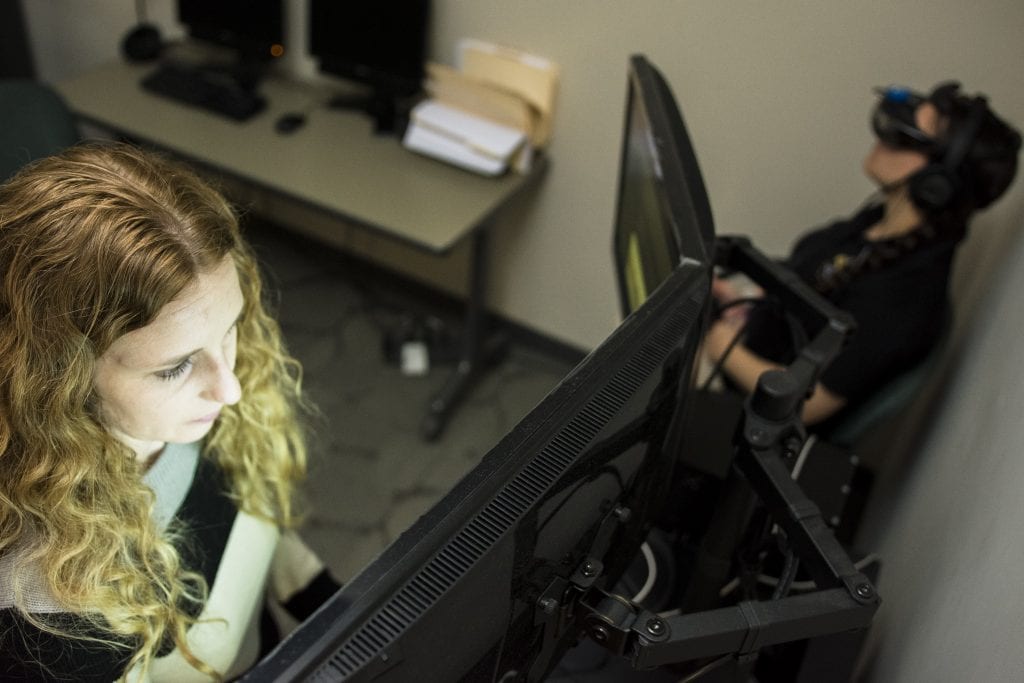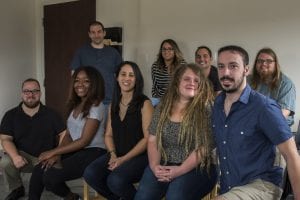Grant Offers Mobility for Psychology Researchers

Dr. Amie Newins runs a virtual reality simulation in the UCF Restores Clinic. A new grant funds mobile equipment so Department of Psychology researchers, including Newins, can run tests outside the laboratory.
Almost $600,000 in new funding from the U.S. Department of Defense allows researchers studying human behavior to escape the limits of the laboratory.
Specifically, the grant funds tools that offer the freedom and mobility to study how people interact with their environments in real time. These include augmented and virtual reality devices, and tools that measure neurophysiological responses.

The team of researchers on the project include from left, Dr. Joseph Schmidt, Dr. Mark Neider and Dr. Florian Jentsch. Not pictured: Melissa Dagley; Dr. Mindy Shoss; Dr. Corey Bohil.
“One of the common limitations in studying human factors is that it happens in an artificial environment,” said Mark Neider, Ph.D., associate professor of psychology. “For example, studying people in isolation is not realistic because most of the day we’re interacting with groups of people.
The grant was made possible through the DoD’s Research and Education Program for Minority-Serving Institutions; UCF was designated a Hispanic-Serving Institution in February.
“I am happy to see our faculty making the most of the funding opportunities available to us as a Hispanic-Serving Institution, and greatly appreciate Dr. Neider’s contribution to these efforts,” said Cyndia Morales Muñiz, Ed.D., director of HSI culture and partnerships.
Human factors blends multiple disciplines together to develop more intuitive technology. The positioning of a steering wheel in a car and the classic layout of a phone’s number keypad, for instance, were developed by studying human factors.
Through the DoD grant, faculty in the Department of Psychology, UCF Restores and UCF STEM are developing ways to improve communications and message delivery. One of the potential outcomes is improving the effectiveness of military operators. This could range from “smart” glasses that accurately acquire a target to silent communications between members of a team.
Getting to that point requires a fundamental understanding of human actions like tracking the movements of eyes when interacting with an environment. Proposed experiments will take advantage of AR’s mobility and give study subjects real-world obstacles to overcome.
In the future, “this information could be near instantaneously integrated across team members so that threats and items of interest can more rapidly be identified and converged upon,” according to the grant proposal.
Other proposed areas of study include human interaction with robots and improving military training for pilots and support personnel.

Graduate students will learn how to conduct hands-on research using the new equipment.
Because all of the equipment purchased under the grant is mobile, K-12 students across Central Florida can enjoy learning and experiencing the power of AR and VR firsthand. On-campus activities like STEM Day and the Summer Institute immerse students in hands-on learning, while the Florida Engineering Education Conference equips K-12 STEM teachers to effectively teach the latest technology.
“This grant brings value on multiple levels, not just in terms of developing new technology, but also by enhancing our ability to study human behavior directly in the environments where people live, work, and play,” Neider said.
